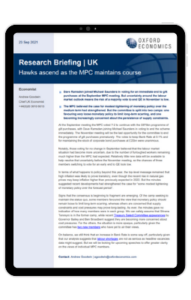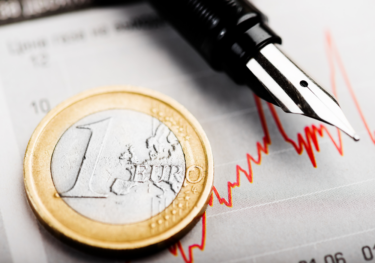For the UK economy, catastrophising can wait

A glance at recent headlines in the UK could leave the reader feeling beleaguered. An economic recovery slowing to a crawl, the prospect of a surge in household energy bills, a lack of wind to generate power and motorists responding to reports of a shortage of tanker drivers by draining petrol pumps dry. So the tongue-in-cheek question posed recently by Bank of England Governor Andrew Bailey at the Oxford Economics-sponsored Society of Professional Economists annual dinner: “when is the plague of locusts due?”, may strike some as more serious than it was intended.
But the UK seems unlikely to replace ancient Egypt as the archetypal victim of disaster, to say the least. Certainly, the economic outlook isn’t as bright as we were hoping a few months ago. Supply chain disruption and bottlenecks have contributed to a downgrade in our forecast for GDP growth in 2021. In June, we were expecting an expansion of 7.7%, but this has dropped to 6.9% in our latest forecast. At the same time, inflation looks set to peak higher, and stay elevated for longer, than we were expecting earlier this year.
But growth of close to 7% would be a post-war high. And our latest forecast still points to the economy regaining its pre-Covid size by the turn of 2021/2022. At the start of this year, most professional economists didn’t expect that to happen until late 2022. The threat of rapidly rising prices is a localised one, confined, so far, to a few pockets. And current headwinds to growth are far from unique to the UK. The global shift in consumer spending patterns triggered by the pandemic and the simultaneous reopening of economies has put inevitable pressure on supply chains, manifesting itself across the world in shortages of components and labour and unusually high inflation, at least by the standards of recent years. As an economy which locked down harder and for longer than most, the UK is more exposed to the challenges of returning to normal. And those challenges have been exacerbated by Brexit.
But to use a term favoured by the BoE Governor, we think the current tribulations afflicting the UK economy (and, indeed, others further afield) will prove transitory. Shortages and price rises should prompt both increases in supply and efforts to economise. And a return to more normal, pre-pandemic, spending patterns, as consumers substitute services for goods, will take some of the strain off the supply-side and associated pressure on prices.
We started with a biblical reference from the BoE Governor, so it might be appropriate to end with one from Joel, Chapter 2, which, after a difficult period for the economy, nicely sums up our longer-term view: “And I will restore to you the years that the locust hath eaten”.
Tags:
Related Services

Post
Nowcast shows wage growth slowing sharply
Our sentiment data, developed with Penta, suggests that UK private sector wage growth slowed sharply in March and early-April. If official data mirrors our sentiment indicator, it should keep the Monetary Policy Committee on track to cut interest rates in the summer.
Find Out More
Post
The euro and depreciation – shake, shake it off
Our new forecast assumes a slower euro appreciation against the dollar over the coming years than we previously anticipated. Relative productivity, terms of trade, and the current account will likely be less supportive of the euro than we thought. In addition, a stronger stock market than initially envisaged will attract more financial flows into the US than we had expected.
Find Out More